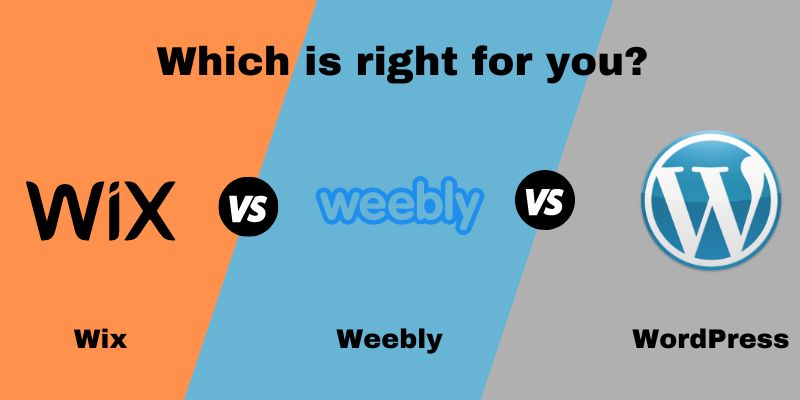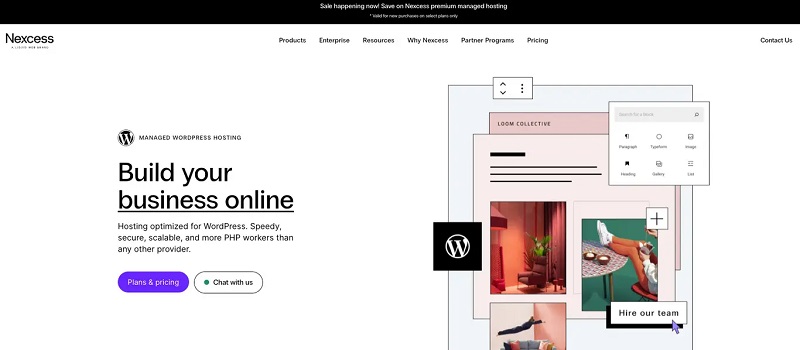
Wix vs Weebly vs WordPress: Which is right for you?
Each Wix vs. Weebly vs. WordPress web-building platform has its advantages and disadvantages, which is why one has to know them to make the right choice. Three of the most successful and popular site builders of the present era can be selected depending on some element of their utility, usefulness, and some minor drawbacks. These differences shall cover several areas of these social media sites so that you can make a good conclusion.
1. Overview
Wix

Wix is a web-based platform that allows users to build websites with easy-to-use drag-and-drop features, avoiding complicated coding. This is suitable for small businesses, portfolios, and personal sites and blogs.
Weebly

Weebly, which has recently become a part of Square, ranks among the simplest website builders that prioritize usability. It also includes e-commerce features that make it suitable for small businesses and online shops.
WordPress

WordPress is a versatile CMS that is currently used by over 40% of all websites that are active on the internet. It comes in two versions: Word press. Atcom (a hosted platform) and WordPress. Org (self-hosted). WordPress. Org provides users with greater freedom and settings adjustment but could be more user-friendly.
2. Ease of Use
Wix
Wix is fairly recognized for its simplicity in use. This solves the problem of the impossibility of arranging elements in a certain way through the utilization of drag and drop service that allows placing an element at any part of the page. Wix also has an artificial drag-and-drop website creator (Wix ADI) that will build a website based on the answers given by the user.
Weebly
Wix and Weebly both have a drag-and-drop interface, but Weebly’s is not as flexible as Wix’s. And while simplicity is often a selling factor, especially for amateurs, they might find Wix’s options a lot to deal with.
WordPress
WordPress. Different from the previously described models, WordPress.org requires more effort to learn and understand. Users need to install WordPress on their web hosting, update it themselves, and often work with HTML, CSS, and PHP. WordPress. Com makes some of these processes easier, but it does not come with the drag-drop facility, which is available in Wix or Weebly.
3. Design and Customization
Wix
Wix has over 800 templates that are also 100% customizable. However, in the work with the concrete type of the template, one can only change the template type after reconstructing the site. Wix also has a well-developed application store that allows it to expand its capabilities.
Weebly
The choice of templates in Weebly is less vast than that observed in Wix; however, it offers good customization. Third-party integration is also supported in this builder to allow for connectivity with applications and services.
WordPress
WordPress. Out of the three, org is the most customizable. A large number of topics and plugins are available at your disposal, which means you can build almost any site you can imagine. WordPress. Com still has limited choices of themes and plugins, but the degree of choices is still wide.
4. E-commerce
Wix
Thus, Wix incorporates strong commerce capabilities in Business and e-commerce plans. It helps with products, payments, and numerous selling tools enhanced on sales pages. However, the functions that are specific to Wix cannot compete with more extended options available for other platforms and appropriate for extensive online stores.
Weebly
The company excels in e-commerce, especially after Square acquired it. For stores, it offers all-around solutions that range from inventory tracking and shipping choices to integration of Square’s payment gateway.
WordPress
WordPress.org, when inclusively used with the WooCommerce plugin, constitutes one of the strongest e-commerce platforms. It supports multiple products, multiple gateways, and multiple customization options, and it is unlimited. WordPress. Com also supports e-commerce but is even more limited than the previous two types.
5. Blogging
Wix
Wix has a built-in blogging option, but WordPress is more robust. It is good for basic bloggers with primary blogging tool requirements.
Weebly
Weebly offers basic blog creation tools with no blogging platform options, unlike WordPress, although Weebly’s blogging is simplistically easy to use.
6. SEO
Wix
It is an area Wix has expanded on greatly over the years. Meta tags, descriptions, and keywords, alt tags on images, and a simple SEO Wizard that helps people optimize their sites.
Weebly
Here, Weebly has basic and understandable SEO tools, namely the possibility to set meta descriptions and custom URLs and add alt tags to images. However, it may not be as comprehensive as that of WordPress when it comes to control.
WordPress
WordPress is considered one of the most effective platforms for SEO because of the flexibility and availability of such strong plugins as Yoast SEO and All in One SEO Pack. Both of these tools are some of the most complete that exist for SEO, and that is why WordPress is perfect for those who consider it relevant to SEO.
7. Support and Community
Wix
Wix has customer support, which is available at any time of the day using the contact form and telephone line. However, the Help Center is very developed, and there are many tutorials and instructions there. The Wix community is also helpful, with forums and content created by other users to complement the help.
Weebly
Weebly provides customer support via phone, live chat, and email support services. The Help Center is clearly structured; a community forum might also prove useful for navigation by users.
WordPress
WordPress.com also has live chat and email support with most plans, although customers with higher-tier plans have precedence. WordPress. Org is maintained by the users of the services provided through active forums and detailed documentation. Blogs, tutorials, and courses are also on the web in thousands of places, providing a step-by-step guide and knowledge.
8. Pricing
Wix
Wix also has an available and mostly free plan, but the domain is Wix branded, and their ads are also seen. The basic package is free, while the paid plan begins at $14/month for the Professional plan and $39/month for the Business VIP plan. Freemiums are free of charge, and e-commerce plans cost $23 for the Basic monthly subscription.
Weebly
Weebly users can access Branded Domains and Ads through the free plan. Basic plans start at $6 per month and go up to $26 per month for the Performance plan, which is ideal for e-commerce businesses.
WordPress
WordPress.com offers a free plan with limited features. Paid plans range from $4 to $45 per month. WordPress.org is free to use, but you’ll need to pay for hosting, domain registration, and any premium themes or plugins you choose to use. Hosting can cost as little as $3 to $10 per month.
9. Pros and Cons
Wix
Pros:
- Intuitive drag-and-drop interface
- Extensive template library
- Robust app market
Cons:
- Some templates have some level of interactivity where one can switch between the two.
- It is less flexible when it comes to more complex customization procedures.
- E-commerce is one area where the actual implementation may not be as adaptable for the scale of the stores that sales operations will require.
Weebly
Pros:
- Easy to use
- The House of Later Created good e-commerce Integration with Square.
- Solid customer support
Cons:
- Limited template selection
- Less customizable than WordPress
WordPress
Pros:
- Highly customizable
- Extensive plugin ecosystem
- Recommended for blogging and SEO as they come with the default settings.
Cons:
- Steeper learning curve
- Requires more hands-on management
- Premium themes that can offer advanced features and plugins are not cheap, along with good hosting.
10. Performance
Wix
Overall, the Wix websites offer quite decent reliability and speed of the presented content. Wix can rely on a list of servers located across the world and has numerous features to help increase the speed of your site, such as the absence of image optimization.
Weebly
Weebly has adequate usability and generates small load times. The platform is self-service oriented, which means it will set your website for speed and reliability as a default. Still, the performance can be quite different – it will largely depend on the site loads and the quantity of information processed.
WordPress
Primarily, the effectiveness of a given WordPress site can be determined by the overlying host and the applied optimization methods. WP Engine or Kinsta are examples of managed WordPress hosting services that provide environments that are specifically optimized for WordPress and aim to achieve fast loading time and high reliability. Other plugins that can also be used include W3 total cache and WP super cache.
11. Security
Wix
Wix handles security at the platform level. Every Wix website is provided with free SSL certification; the site builder does the security patching. This makes it convenient for users who wish to avoid being bothered with the aspects of security.
Weebly
Weebly further offers free SSL certificates for sites and handles basic security using the updates and patches necessary for a site. Even though the platform is designed to be safe, the users themselves have to be careful and keep their profile information secured, especially their passwords.
WordPress
This means that WordPress security is only as strong as the user implementing that security protocol with WordPress. Updates, security plugins, such as Wordfence or Sucuri, and making sure that your website is safe and protected all lie on you as the user of the org. Managed WP hosting services offer supplementary security options. However, the user remains mostly on your own when it comes to security.
12. Integrations and Plugins
Wix
The application and services marketplace of Wix includes a great number of apps used for SEO, e-commerce, marketing, and social network integration, to name a few. However, while the choice is quite wide, the offer cannot compete with WordPress in terms of variety.
Weebly
The App Center of Weebly has a vast collection of integrations, which is especially suitable for business purposes. While compared with Wix and WordPress, it provides less variety but entirely provides all the basic services the majority of users require.
WordPress
WordPress. of org stands tall as the largest library of plugins and integrations, with more than 58,000 plugins. This huge variety facilitates adding almost any function to the site. WordPress. While it has a variety of options, com has fewer options but still lists integrations to meet many needs.
13. Community and Resources
Wix
There is an active community, and there are a lot of resources, including tutorials, articles, and video lessons, in the Wix help center. Users can also discuss with others in the forum section and find help or answers from Wix’s support team.
Weebly
Weebly has a strong support center in terms of articles, guides, and a community forum for getting help and support. The support personnel are accessible through an email address, live chat, and phone calls to assist the users when necessary.
WordPress
WordPress. The org is one of the most popular sites with millions of participants and an immeasurable amount of forums, blogs, tutorials, and tips. The WordPress Codex, together with the developer resources, is well documented. WordPress. Similar to other websites, com users also get a chance to rely on support and community material, but the support level depends on the plan chosen.
14. Scalability
Wix
For all those planning to set up small to medium websites, Wix is a suitable offer. However, it has its weaknesses in its scalability and manipulating capabilities in very vast projects or where there is a need for highly specific adjustments.
Weebly
Another advantage of Weebly is that it is rather suitable for small to medium-scale businesses. It can be suitable for small online stores because it is strong in e-commerce, although, unlike WordPress, it could be better for ultra-large websites.
WordPress
WordPress.org is also very flexible and can support anything ranging from a small blog to a full-fledged corporate website. Because of these factors and its ability to integrate with a wide number of plugins, it is suitable for projects of any scale. WordPress. Com is more limited in allowing such changes to a site, yet it can also expand by size as per the plan in the package to which they have subscribed.
15. Migration Options
Wix
However, it may be difficult to migrate away from Wix. Sadly, there is no simple and easy way to export your content, and even then, some of the data and design might need to be recovered.
Weebly
Another disadvantage of Weebly is selecting few migration features or lack of them in this particular instance. Exporting content is optional, and like what we have seen with Wix, you might lose on some of the designs.
WordPress
WordPress. This is because the migration process in the <org> is rather simple as compared to other options. Also, most hosting providers provide free migration services, and various plugins can be of help. WordPress. Com also offers facilities for inter BA, from whence you can export your content to WordPress to migrate. Transferring within the platform is also more fluid than to org, where users would have to shape their writing to fit many paradigms, some of which are as follows:
16. Additional Features
Wix
- Artificial Design Intelligence (ADI): Wix ADI is a tool that can design a website for you from a few questions that you will answer.
- Wix Corvid: A system to develop complex web applications, usually by skilled internet developers.
- Multilingual Support: There exists the ability in Wix to build multilingual sites.
Weebly
- Square Integration: Great for businesses that utilize the Square for payments.
- Mobile App: These mobile applications allow you to manage your Weebly website and store on the go effectively.
- Membership Options: Develop user/ membership zones for premium material.
WordPress
- Multisite: Conduct the administration of several sites within the framework of one WM, focusing on WordPress.
- Gutenberg Editor: A concept that loosely translates to a more flexible block-level content creation environment.
- REST API: The ability to communicate with WordPress sites from outside applications is possible.
Conclusion
Deciding between Wix, Weebly, and WordPress depends on the need of the specific site, complexity, and skill level when it comes to designing a site.
Wix: Features: It is ideal for users who are looking for a website builder that incorporates, easy to use, mostly accompanied by numerous templates and apps. Good for sites that receive a small amount of traffic and for users who like the interface of the WYSIWYG editor.
Weebly: For small businesses that are into online sales and possibly are already using Square for payment. As an assembly offer, it presents a fairly uncomplicated building process and economical e-commerce elements.
WordPress. org: Thus, the best solution for clients who need many refinements, flexibility, and the greatest number of options in the editing of their website. It is suitable for blogs, extensive websites, and users who can handle issues with hosting and security. It is also possible to recommend Com because it is considered to be a hosted solution that allows some freedoms similar to WordPress.
However, all of them have relative advantages and disadvantages, so they have to be assessed according to the requirements to be selected as the most suitable one.
You can also read our related articles: